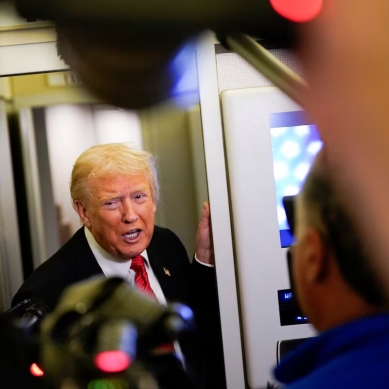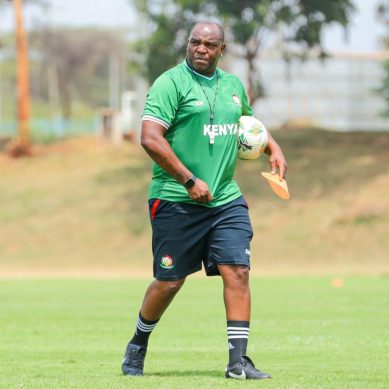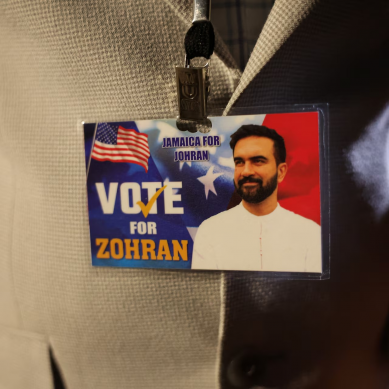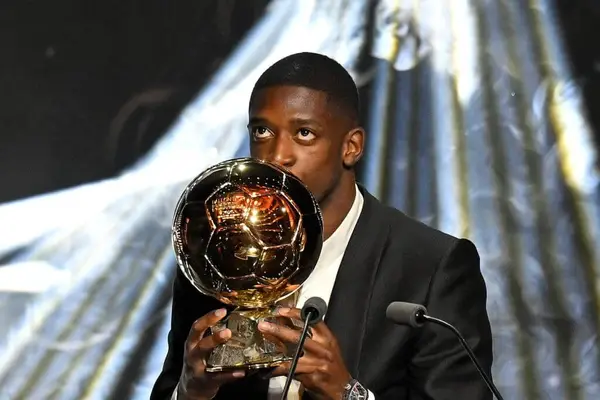
A remarkably two-footed player, Ousmane Dembele had always enjoyed playing in central positions, having operated as a No 10 at both Rennes and Borussia Dortmund and as part of a two-man strike-force under Ronald Koeman at Barcelona.
Deployed now at Paris Saint-Germaine (PSG) as the cutting edge of a dizzyingly well-oiled football machine, he was fully fulfilling his enormous potential at long last.
Winning Ballon d’Or on Monday was world’s reward for player who has given so much to football.
“What’s good about this role is that he’s at the heart of the action and he can participate in the build-up play, but he can also finish things off,” says Dembele’s close friend Moustapha Diatta. “It’s a role that he accepted, initially out of a sense of duty in order to respect what the coach expected of him, but then out of pleasure because scoring goals, combining with his team-mates and being at the heart of the action has given him a lot of pleasure.
“When people talked about Ousmane, it was always about what he might become if he started scoring goals. This year, everyone has the answer.”
Inevitably, Dembele’s rapid rate of goal-scoring could not last forever, but what his goals lost in frequency, they more than made up for in importance. Against Liverpool in the Champions League last 16 and Arsenal in the semi-finals, he scored strikingly similar goals that showcased both his tactical intelligence and his newfound poacher’s instincts. He dropped deep to help his team escape the opposition press, spread a pass out wide to a team-mate, and then moved into the box to apply the finishing touch.
When he did not score, he remained decisive, contributing assists in both legs of the Champions League quarter-final win over Aston Villa, teeing up Achraf Hakimi for the goal that put paid to Arsenal in the semi-final second leg, and laying on goals for Doue and Khvicha Kvaratskhelia in PSG’s 5-0 annihilation of Inter in the final (in addition to supplying the brilliant backheel that paved the way for Doue to score the killer third goal).
But the image of Dembele that went viral after the final did not depict him doing anything with the ball. Instead, it was the sight of him lurking with intent on the edge of the penalty area at Inter goal kicks, eyes wide open and riveted on opposition goalkeeper Yann Sommer, ready to set PSG’s ultra-aggressive press into action the moment the ball was kicked. Previously derided as a soloist, liable to get lost in his own dribbles, here was a player wholly – even a little terrifyingly – committed to the team cause.
“For me, a forward isn’t allowed to cheat,” Dembele told France Football at the end of the season. “He has to put the effort in all the time, whether that’s in a defensive sense or an attacking sense, to help the team and not just when we’re attacking.
“The coach came to speak to me at the beginning of the season. He told me that I had to set an example for the younger players, that I was the first defender in the team. The message got through.”
Although Dembele has occasionally driven his coaches to distraction over the course of his career, his naturally cheery, carefree demeanour has invariably made him highly popular with his team-mates. Doue, Dembele’s team-mate with both PSG and France, has described him as a “big brother”. Vitinha, citing his role in PSG’s minutely calibrated pressing game, says he is “a leader by example”.
“Aside from football, he is a very good person,” PSG midfielder Joao Neves said earlier this year. “He’s fun, he’s friendly and he’s always in a good mood – well, in the morning, sometimes not! But he’s almost always in a good mood. And as a football player, he’s a world-class superstar. I’m really happy to be his team-mate.”
Victory over Chelsea in the Club World Cup final would likely have removed all suspense regarding Dembele’s Ballon d’Or candidacy, but although he and his team-mates finished on the wrong end of a surprisingly one-sided 3-0 defeat at MetLife Stadium, PSG’s No 10 had already made a mark on the competition, recovering from an injury that kept him out of the group phase to score against both Bayern Munich and Real Madrid in the knockout rounds.
It undoubtedly helped that Barcelona’s Lamine Yamal, his main rival for the prize, did not even feature at the tournament. But as the stand-out player for the European season’s stand-out team, and in the absence of any major international tournaments, which might have allowed any number of players to steal his limelight, Dembele was an entirely logical choice.
If the Ballon d’Or serves above all as recognition for what the player who wins it has achieved over the preceding 12 months, it is also, inevitably, a reflection of what every other eligible player has not achieved.
Yamal undoubtedly dazzled for Barcelona, notching up 18 goals and 25 assists in all competitions and causing jaws to hit the floor on a weekly if not twice-weekly basis, but despite tasting glory in La Liga, the 18-year-old Spain international – and likewise his Barca team-mate Raphinha – was penalised by the club’s inability to go all the way in the Champions League. Ditto Mohamed Salah, despite his extraordinary season with Premier League champions Liverpool.
With Cristiano Ronaldo and Lionel Messi’s careers now easing down (not that the former would ever admit it), two men who once seemed destined to succeed them as the game’s pre-eminent footballers experienced seasons of contrasting fortunes. Mbappe enjoyed a successful maiden campaign at Real Madrid on a personal level, scoring 44 goals in all competitions, but only won the UEFA Super Cup and Intercontinental Cup, while Erling Haaland finished empty-handed for the first time in his Manchester City career.
A place on the podium in last year’s Ballon d’Or, meanwhile, proved to be something of a poisoned chalice. Winner Rodri spent almost the entire season on the side-lines, runner-up Vinicius Junior has been in a funk ever since missing out on the award, and third-place Jude Bellingham was unable to recapture the heights of his first season at Real Madrid.
As for Dembele’s PSG team-mates, although Hakimi, Vitinha and Nuno Mendes – to name but three – were all outstanding candidates in their own right, they were always likely to be eclipsed by the club’s principal attacking star.
At Rennes, Dembele was the scatter-brained boy wonder who did not even know which was his stronger foot. At Dortmund, he was a shining star whose light suddenly dimmed when he went on strike to force through a move away. At Barcelona, he was by turns the undisciplined youngster, the perennial injury victim and the big-money flop, before growing up, learning how to take care of his body and becoming a dependable performer.
At PSG, he became the best footballer in the world.
- A Tell Media report / Adapted from The Athletic







